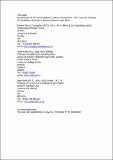Files in this item
Development of the cancer-related loneliness assessment tool : using the findings of a qualitative analysis to generate questionnaire items
Item metadata
| dc.contributor.author | Cunningham, K. B. | |
| dc.contributor.author | Kroll, T. | |
| dc.contributor.author | Wells, M. | |
| dc.date.accessioned | 2018-09-14T23:35:35Z | |
| dc.date.available | 2018-09-14T23:35:35Z | |
| dc.date.issued | 2018-03 | |
| dc.identifier | 250889855 | |
| dc.identifier | 9ff124c3-900c-4cbc-a861-8dfdcb333eaf | |
| dc.identifier | 85044369297 | |
| dc.identifier.citation | Cunningham , K B , Kroll , T & Wells , M 2018 , ' Development of the cancer-related loneliness assessment tool : using the findings of a qualitative analysis to generate questionnaire items ' , European Journal of Cancer Care , vol. 27 , no. 2 , e12769 . https://doi.org/10.1111/ecc.12769 | en |
| dc.identifier.issn | 0961-5423 | |
| dc.identifier.other | Bibtex: urn:2914fb23812f1f8329ec98ecfa0543ac | |
| dc.identifier.other | ORCID: /0000-0002-3300-7220/work/60631182 | |
| dc.identifier.uri | https://hdl.handle.net/10023/16030 | |
| dc.description | The work was supported by a University of Dundee Ph.D. studentship. | en |
| dc.description.abstract | The aim of this research was to develop a tool to identify and assess the qualities of cancer-related loneliness in adult cancer survivors who have completed treatment. In addition to reporting the development of the tool, we explicate the process of using the findings of a qualitative analysis to generate questionnaire items, as currently little guidance exists on this topic. The findings of our qualitative research exploring the experience of loneliness in adult cancer survivors who had completed treatment, together with the findings of our concept analysis of loneliness, were used to develop an assessment tool for cancer-related loneliness following treatment completion. Cognitive testing was undertaken to assess fidelity of comprehension and feasibility in administration. The Cancer-Related Loneliness Assessment Tool is a ten-item self-report questionnaire capturing the essential elements of cancer-related loneliness following treatment completion. Experts believed the questionnaire to be face-valid and usable in clinical practice, and preliminary cognitive testing indicated that the items generate the information intended and individuals have little trouble completing the tool.Following further development work, the tool could be employed to identify cancer-related loneliness following treatment completion. It could also aid with the development/adaptation and evaluation of person-centred interventions to address such loneliness. | |
| dc.format.extent | 2689648 | |
| dc.language.iso | eng | |
| dc.relation.ispartof | European Journal of Cancer Care | en |
| dc.subject | Cancer survivors | en |
| dc.subject | Loneliness | en |
| dc.subject | Assessment tool | en |
| dc.subject | Questionnaire development | en |
| dc.subject | Qualitative findings | en |
| dc.subject | H Social Sciences | en |
| dc.subject | RC0254 Neoplasms. Tumors. Oncology (including Cancer) | en |
| dc.subject | NDAS | en |
| dc.subject | SDG 3 - Good Health and Well-being | en |
| dc.subject.lcc | H | en |
| dc.subject.lcc | RC0254 | en |
| dc.title | Development of the cancer-related loneliness assessment tool : using the findings of a qualitative analysis to generate questionnaire items | en |
| dc.type | Journal article | en |
| dc.contributor.institution | University of St Andrews. School of Medicine | en |
| dc.contributor.institution | University of St Andrews. Population and Behavioural Science Division | en |
| dc.identifier.doi | 10.1111/ecc.12769 | |
| dc.description.status | Peer reviewed | en |
| dc.date.embargoedUntil | 2018-09-15 |
This item appears in the following Collection(s)
Items in the St Andrews Research Repository are protected by copyright, with all rights reserved, unless otherwise indicated.

